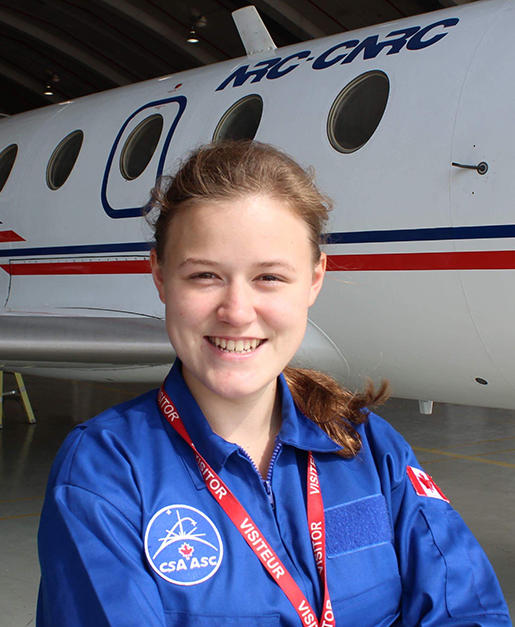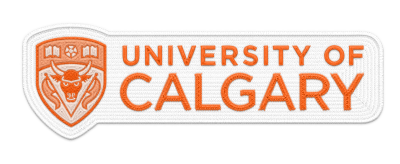Recent graduate

Where is she today?
She is currently completing a Master of Applied Science degree in biomedical engineering at the University of British Columbia, focusing on bioprocessing for cell-based therapies, with the goal of completing a PhD.
Solving space exploration challenges
Since high school, Alina Kunitskaya’s dream has been to become an astronaut. With no clear career path to becoming an astronaut, Alina has focused on finding a field she is passionate about and striving to excel in that field. Alina Kunitskaya completed her BSc in Chemical Engineering with Biomedical Engineering specialization from the University of Calgary in 2018. Her passion for solving space exploration challenges led to her involvement in developing a process to recycle astronauts’ fecal waste into 3D-printable bioplastics, developing and flying a scientific payload in microgravity, developing an oxygen production process on Mars, and completing a simulated sub-orbital spaceflight to help scientists examine the physiological and psychological impacts of g-forces associated with spaceflight. Kunitskaya is currently pursuing a MASc degree in Biomedical Engineering at the University of British Columbia with a goal of completing a PhD in this discipline. Most recently, Kunitskaya was selected by the Canadian Space Agency as one of 150 delegates (selected from over 750 applications) representing 51 countries to attend the Space Generation Congress, where she helped develop recommendations to NASA and the United Nations Committee on the Peaceful Uses of Outer Space on sustainable Lunar exploration. Canadian Space Agency also awarded Kunitskaya with a scholarship to present her undergraduate capstone project on oxygen production on Mars at the International Astronautical Congress 2019, the largest space conference in the world.
While there is a crucial need for advancements in bioprocess engineering to achieve economic manufacturing of emerging cell-based therapies on Earth, bioprocess engineering skills could also be relevant for life sciences research in space and for developing biological processes for future human missions to Mars.
Alina Kunitskaya
BSc (Eng)'18
What is your favourite memory from your time at UCalgary?
My favourite memory is working with the UCalgary iGEM (International Genetically Engineered Machine competition) team. In 2017, our team developed a process to recycle astronauts’ fecal waste into a bioplastic using genetically engineered bacteria. This bioplastic could be used to 3D print useful items for astronauts during future Mars missions. Working on this project was not only an opportunity to apply both chemical and biomedical engineering knowledge to address a real-world space exploration challenge but also an exciting opportunity to experience interdisciplinary, student-led research. Through this experience, I gained valuable teamwork, leadership, scientific communication, and hands-on skills. Following the iGEM competition, I led a team of students to further develop a sub-system of the 2017 UCalgary iGEM project as a microgravity payload. I was honoured to be selected by the team to fly the payload aboard a parabolic flight aircraft. Experiencing weightlessness during a parabolic flight was a dream come true.
What was your favourite campus hang-out spot?
My favourite campus hang-out spot was the Specializations Homeroom (a homeroom for engineering students pursuing either Biomedical Engineering or Energy and Environment specializations). No matter what time of day, I would always see at least a couple of friends hanging out there as well. The room was also equipped with microwaves and had a good amount of ambient light, making it a convenient spot for taking a break, catching up with friends, or studying.
What advice would you give your student self, knowing what you do now?
Especially in my first two years of undergrad, it sometimes felt like there are not enough opportunities to get involved in space related activities. My advice to my student self is to do thorough research of potential opportunities both inside and outside of Calgary and reach out to people working in the industry to seek their advice. I later learned about organizations such as SEDS-Canada (Students for the Exploration and Development of Space), Association of Spaceflight Professionals, and Space Generation Advisory Council that offer opportunities to get involved from anywhere in the world. My other advice is to create opportunities for yourself, for example, starting a club on campus. I would also tell my student self to follow this advice from Canadian astronaut Chris Hadfield: “Decide in your heart of hearts what really excites and challenges you and start moving your life in that direction. Every decision you make, from what you eat to what you do with your time tonight, turns you into who you are tomorrow, and the day after that. Look at who you want to be and start sculpting yourself into that person.”
How did your engineering degree help you get to where you are today?
During my engineering degree, I was fortunate to gain both research and industry experiences that led me to where I am today. Completing a 12-month internship with BioMarin Pharmaceutical, a California-based biotechnology company developing therapeutics for life-threatening rare genetic diseases, helped me decide what I’d like to do after graduation – I chose to pursue graduate studies specializing in bioprocessing research. While there is a crucial need for advancements in bioprocess engineering to achieve economic manufacturing of emerging cell-based therapies on Earth, bioprocess engineering skills could also be relevant for life sciences research in space and for developing biological processes for future human missions to Mars. The connections I made during my internship and the research/industry skills I gained during my degree helped me secure a graduate student position with my current lab. My involvement in space-related research and activities throughout my engineering degree helped me secure opportunities post-graduation. For example, I recently attended the Space Generation Congress and had an opportunity to present my undergraduate capstone project titled “Oxygen Production on Mars with In-Situ Resource Utilization” at the largest space conference in the world. Most importantly, I learned throughout my engineering degree that no problem is unsolvable, especially if you work with an interdisciplinary team to solve it.
How has your career path evolved and changed since your graduation?
I started graduate school shortly after graduation from UCalgary and, so far, have been following the plan – pursuing a MASc degree and working towards fast-tracking into a PhD program. My current studies and research are specialized in bioprocess/biochemical engineering rather than general chemical engineering. I continue to seek opportunities to include space exploration into my studies and extra-curricular activities. I recently proposed to adapt the technology developed in our lab to address life sciences research needs in space. In my free time, I continue working on the iGEM Calgary 2017 project in collaboration with the Association of Spaceflight Professionals. Together with other members of my capstone group, we are also looking into commercialization of our capstone project.
